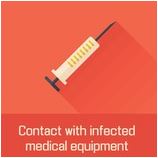
Americans are not as free as you think when there’s a global health crisis at foot. With the rise of the Ebola epidemic in West Africa comes reasonable concern for the safety of the American people. Fear of the disease spreading through air travel and the number of healthcare workers offering aid to Ebola patients overseas have created questions about our safety at home. Politicians have responded by taking actions they believe will keep Americans safe. But there is always a cost to safety, and unfortunately that cost is our individual rights.
The 10th Amendment
The government has more power than you think. Under the 10th Amendment, state governments have the power to quarantine or restrain an individual to prevent the spread of a disease. Many states are exercising their power through mandatory quarantines of healthcare professionals and others returning from West Africa. This is done despite a lack of proof that an individual is infected with the disease. Some politicians have even requested an air travel ban on anyone returning from the region. But this is far beyond what the Obama Administration is willing to do. At the moment, a health crisis has not been declared in the United States. The only federal response has been the implementation medical checkpoints in a select number of airports. The goal is solely to screen for individuals showing signs of disease.
Response of State Politicians
In New Jersey, Governor Chris Christie imposed a 21-day quarantine on healthcare worker Kaci Hickox who had been working with Ebola victims in West Africa. Although Hickox showed no symptoms of the disease, she was sent to an isolation tent outside a New Jersey hospital. She was only allowed to return home after seeking legal support. But Governor Paul LaPage continued to seek quarantine for Hickox, asking her to remain in her home for the full 21-day period. The governors were acting within their legal rights. But what about Hickox’s rights? And what about the recommendation of the Obama administration and the CDC? The CDC only requires self-monitoring for those returning or arriving from West Africa. The CDC has also reported quarantine to be unnecessary unless symptoms of disease are present.
Civil Liberties at Stake
While the Constitution gives the government power to quarantine, it cannot decide whether an individual poses an actual threat. That is left up to the interpretation of politicians who often cater to the public’s fears. What’s worse, these politicians are also acting against scientific fact. There is no evidence to suggest Ebola can be transmitted by someone who is asymptomatic. The Obama Administration and the CDC hold up this belief. But the actions of local politicians are reactionary. In striving for “safety,” they have created uncertainty about our civil rights. You can’t tip the scales in one direction without a drop on the other side.
Some Americans believe lawmakers like Christie are acting in our best interest. They believe they are doing everything they can to protect the American people. But the time-sensitive nature of disease control is a danger in and of itself. With the suspension of due process, individual liberties are tossed aside. For a nation that prides itself on freedom, this is no small concern. When criminals receive better treatment than philanthropic aid workers, there is clear ground for a legal debate.
Sources
http://fas.org/sgp/crs/misc/ebola.pdf
http://www.usatoday.com/story/news/nation/2014/10/29/ebola-legal-issues-in-maine/18123443/
https://verdict.justia.com/2014/10/31/travel-bans-mandatory-quarantines
http://www.cnn.com/2014/10/06/justice/callan-law-on-quarantine/